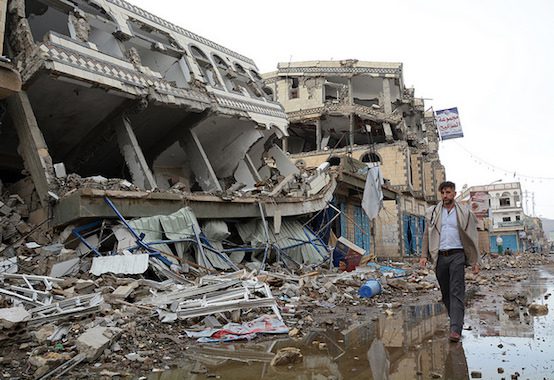The War on Yemen Is Indefensible

Noah Rothman berates opponents of the war on Yemen for trying to end support for the war they oppose. He repeats many of the usual canards that defenders of the Saudi-led war often use, and he works in some factual errors as well:
Most critically, after the fall of Sana’a, the Houthis were expected to turn toward Aden, where the former president Ali Abdullah Saleh was believed to have fled [bold mine-DL]. Aden is a strategic port close to the vital Bab al-Mandab Strait, the two-mile-wide northbound shipping lane of which is Yemeni territory. More than 60 commercial ships transit this strait on a daily basis on their way to the Suez Canal, the Mediterranean Sea, and Europe. Providing Iran with the capacity to shut down, mine, or harass shipping in this strait represented an intolerable threat to American national interests.
Rothman is both poorly informed and actively misleading his readers. The deposed president who fled to Aden was Abdrabbuh Mansour Hadi, who had served as Saleh’s vice president before taking the reins following the 2011 protests that forced Saleh to step down. Saleh was an opportunistic ally of the Houthis when they seized Sanaa (against the advice of Tehran), and he brought with him the backing of a substantial portion of Yemen’s armed forces. In 2015, the Houthis and Saleh were allies, and Saleh was in the capital. Rothman thinks he was on the other side of the conflict in a different city. That’s a fairly significant detail to get wrong while lecturing “reflexive anti-interventionists” about their lack of understanding.
The Saudis and their allies intervened in 2015 to reinstall Hadi despite the latter’s limited base of support at home. Today they remain as far from their stated goal as ever, and they have inflicted all of this misery on the civilian population of Yemen in an unsuccessful effort to put a puppet ruler in power. The Houthis were not then and still are not now Iran’s proxies, their grievances were local ones, and the idea that the Bab al-Mandab would have been under Iranian control is a fantasy used by the Saudis and their cheerleaders to justify an indefensible war. Yemenis rely on imports for their survival, which is why the coalition blockade has been so deadly for the civilian population, so no one in Yemen has any incentive to interfere with or threaten international shipping.
Obama believed that he needed to “reassure” the Saudis and other Gulf clients of U.S. reliability, and so he backed their intervention on the mistaken assumption that it would be brief. It was the worst foreign policy decision Obama ever made, and if Rothman thinks that “any American politician with an ounce of concern for U.S. national interests would have done the same” his judgment is not to be trusted. Three years later, the intervention has failed on its own terms but shows no sign of ending in no small part because U.S. support continues. The war has forced the people of Yemen to pay a staggering and unacceptably high price in the form of indiscriminate bombing, widespread starvation and malnutrition, a massive cholera epidemic, and economic devastation, and worst of all it has been entirely unnecessary.
In addition to wrecking and starving Yemen, the war has not served U.S. interests in the least. To the extent that the U.S. had any interests in the country to be threatened, the war has harmed them. It has destabilized the country and allowed Al Qaeda in the Arabian Peninsula (AQAP) and the local ISIS affiliate to flourish. AQAP forces have sometimes fought alongside coalition forces. The coalition isn’t doing the work of “beating back” these groups, as it is too busy blowing up wedding processions and medical clinics and water treatment plants. The longer that the war drags on, the better it will be for the jihadists and worse it will be for everyone else in Yemen. In the meantime, the U.S. has made itself the enemy of millions of Yemenis who had done nothing to us. This is not “practical” or smart or justifiable. It is a ruinous, horrible policy that the Senate should have voted to end.
Non-intervention in Yemen’s conflict was not only an option in 2015, but it was also pretty clearly the correct one. Three years later, we can see even more clearly that the U.S. should never have had any part in this war, and it is long past time that our government ended its involvement. U.S. support for the Saudi-led war was not something that our government was obliged to provide, nor were there any compelling reasons to do so. Now that we can see the horrifying consequences of enabling this war, no one should still be making excuses for such an indefensible policy.
Comments